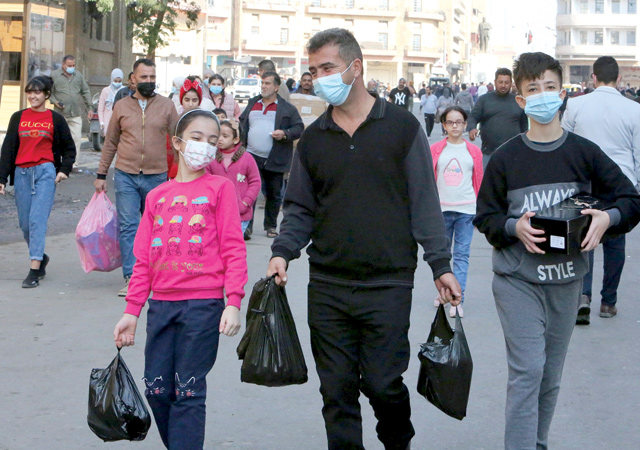BAGHDAD — While much of the world fears COVID-19, Iraqis have mostly stopped wearing facemasks as they worry more about the pandemic's economic impact than the virus itself.
In a war-scarred country burdened by rising job losses and deepening poverty, a majority of citizens seem to have shrugged off the global public health crisis.
In one Baghdad pharmacy, cartons of surgical masks, transparent face shields and disinfectant bottles have piled up despite being on sale at slashed prices.
"There's a general sense that the pandemic has died down and that has led to being people negligent," said Nafea Firas, 23, who works at the pharmacy in the capital's Zayuna district.
Most Iraqis' minds are now far more focussed on the economic hardship caused by plummeting oil revenues and huge delays in payments of state salaries and pensions.
The poverty rate has jumped from 20 per cent to 31.7 per cent this year, said a recent joint study by the United Nations children's agency UNICEF and the World Bank.
Meanwhile infection rates and deaths have indeed fallen, according to health ministry data, in an encouraging trend epidemiologists struggle to explain.
Out of 30,000 tests on December 12, only about 1,000 were positive, down from over 5,000 in a single day in September. The daily death toll fell to 16 from about 70 three months ago.
As Iraq worries less about the coronavirus, most people who entered Firas’s pharmacy ignored a sign asking them to cover their faces, or a disinfectant dispenser at the door.
A rare customer who did wear a mask, a retired soldier, told AFP that “when I walk the streets with my wife and we’re both wearing masks, people look at us as if we’re doing something wrong”.
Iraq recorded its first COVID-19 cases in February and imposed a full lockdown the following month, with airports, land borders, schools, government offices and all public gathering places shuttered until the summer.
Authorities announced a 50,000 dinar (about $35) fine for unmasked commuters, but it was barely enforced.
At the same time, the government has struggled with its worst financial crisis in decades, as oil prices fell sharply.
The state was no longer able to pay its employees or pensioners on time, leaving the livelihoods of entire families hanging in the balance.
Firas, at the pharmacy, said he favours enforcing mask use with fines but acknowledged that “the state wouldn’t be able to impose it, particularly in the lower-income neighbourhoods”.
“And fines would hurt vulnerable people more.”
A Baghdad grocer said that large families simply could not afford the masks, disinfectant spray and other hygiene products, even at their reduced prices.
“Abiding by all these hygiene protocols would require financial capabilities that the poor simply don’t have,” he told AFP.
Efforts to help the poor have meanwhile been hampered by Iraq’s infamous bureaucracy.
Some 200,000 sets of masks and gloves have been stuck at a southern Iraqi port since August due to paperwork delays at the customs authority, a senior official from the International Federation of the Red Cross told AFP.
“These are to protect the people who can’t afford buying masks or gloves — the most in need, who live in crowded places where physical distancing or water and soap are not available enough,” the official said.
Firas recalled similar delays in the early days of the pandemic.
He told AFP there were only two groups of people in Iraq who were known to be committed to use of the medical masks.
First, anti-government protesters who hit the streets last year donned the masks to protect themselves from tear gas fired by security forces.
“I used to carry hundreds of masks and distribute them in Tahrir Square,” Firas said.
The other group, he said, were families with young children who doubled down on hygiene protocols as Iraqi schools reopened in late November after a two-month closure, causing a temporary rise in mask sales.
“At least parents are concerned about the health of their kids,” he said.
By Habib Haj Salem
